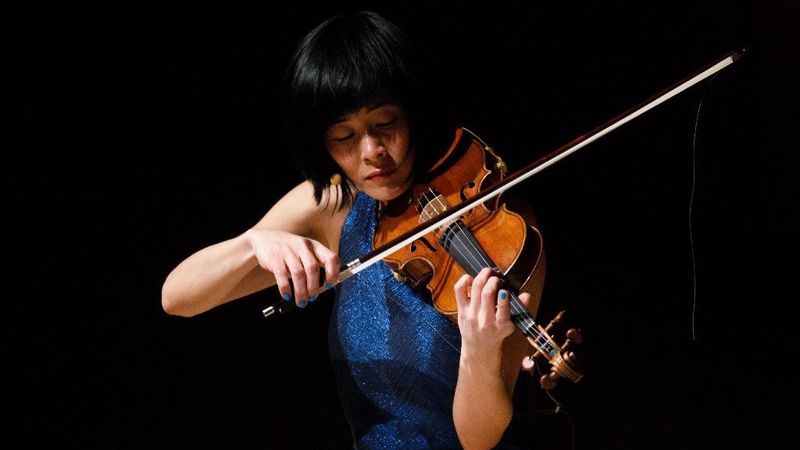Chicago Tribune
By Howard Reich
March 10, 2020
original
link
 Jennifer Koh, shown in 2018, played Courtney Bryan's "Syzygy" with the Chicago Sinfonietta in Orchestra Hall on Monday evening.(Armando L. Sanchez / Chicago Tribune)
Jennifer Koh, shown in 2018, played Courtney Bryan's "Syzygy" with the Chicago Sinfonietta in Orchestra Hall on Monday evening.(Armando L. Sanchez / Chicago Tribune)Chicago Sinfonietta review: Violinist Koh unveils a seductive new concerto
The Chicago Sinfonietta took a considerable risk in co-commissioning a violin concerto from an emerging composer who never had written one.
But that gambit paid off dramatically Monday night, when violinist Jennifer Koh played what conductor Mei-Ann Chen termed “the downtown premiere” of Courtney Bryan’s “Syzygy” in Orchestra Hall (the first performance was Saturday night at Wentz Concert Hall in Naperville). Koh co-commissioned the work as part of her New American Concerto project, a multi-season venture in which she “seeks to engage with and reflect the diversity of America through the traditional form of the violin concerto,” according to her website.
“Syzygy” proved there’s plenty of life left in this grand old form, even after the monumental fiddle concertos of Brahms and Beethoven, Tchaikovsky and Barber.
Composer Bryan, born in New Orleans in 1982, has written a pervasively lyrical work, but one that never descends into saccharine sentimentality. It contains more than enough harmonic interest, structural surprise and instrumental ingenuity to support and counterbalance its soaring melodic lines.
Each of its three movements, played without interruption, represents the composer’s response to a specific art work: Alma Thomas’ “The Eclipse” (1970), Frida Kahlo’s “Tree of Hope, Keep Firm” (1946) and Maya Ying Lin’s “Eclipsed Time” (1994). But you didn’t need to know these pieces to recognize the high craft and tonal beauty of Bryan’s concerto.
The work opened with Koh playing a simple line that soon blossomed into a rhapsodic solo. Here the music ascended to the violin’s highest register, producing otherworldly effects. Before long, the solo violin engaged in beguiling interplay with the orchestra’s winds in some of this movement’s most engaging passages. By this point, listeners realized they were in the hands of a skilled composer of considerable imagination.
The soulfulness and sensuousness of the middle movement came as a balm in an era when so much contemporary music is consumed with making noise. Composer Bryan went in quite the other direction, this movement’s lazy rhythms and luxuriant orchestral textures addressing the ear gently.
Though greater expressive urgency drove the finale, via some rhythmic agitation and solo virtuosity, for the most part composer Bryan here clung to songlike writing.
The work’s only distraction came in the form of certain percussion effects that seemed either extraneous or underdeveloped. If Bryan wishes these bursts of color to be part of the cohesive whole, they should be more than just occasional utterances. If they were dropped in their entirety, the concerto would lose nothing.
Koh played the piece with obvious authority, reveling in its openly expressed emotion and dispatching technically complex passagework with apparent ease. Quite a triumph for composer, soloist and the Sinfonietta.
The program opened with a decidedly less effective work, Adam Schoenberg’s “Finding Rothko,” a four-movement orchestral tone poem inspired by paintings of Mark Rothko. The music proved pleasant but innocuous – a series of pastels with scant harmonic or rhythmic interest, the orchestral equivalent of easy listening.
Mussorgsky’s “Pictures at an Exhibition,” in Ravel’s orchestration, closed the concert, conductor Chen and the Sinfonietta producing a solid performance of an orchestral showpiece. Though a tenuous, troubled tuba solo marred the “Bydlo” (“Cattle”) movement, the bluesy saxophone solo in “The Old Castle” made up for it.
But the evening’s highlight remained Bryan’s “Syzygy,” a work that deserves future hearings and a recording. Perhaps with the Sinfonietta?
Copyright ©2019 Chicago Tribune
© Jennifer Koh, All Rights Reserved. Photography by Juergen Frank. Site by ycArt design studio